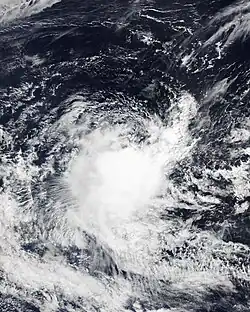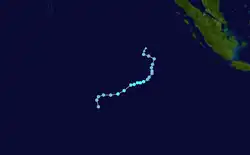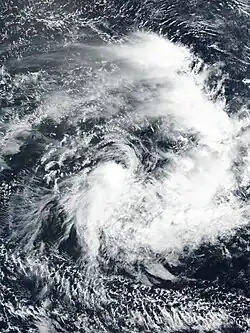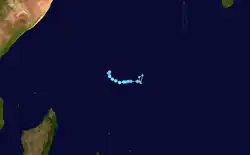2025–26 South-West Indian Ocean cyclone season
| 2025–26 South-West Indian Ocean cyclone season | |
|---|---|
 Season summary map | |
| Seasonal boundaries | |
| First system formed | 16 July 2025 |
| Last system dissipated | Season ongoing |
| Strongest storm | |
| Name | Awo |
| • Maximum winds | 65 km/h (40 mph) (10-minute sustained) |
| • Lowest pressure | 1000 hPa (mbar) |
| Seasonal statistics | |
| Total disturbances | 2 |
| Total depressions | 2 |
| Total storms | 1 |
| Tropical cyclones | 0 |
| Intense tropical cyclones | 0 |
| Very intense tropical cyclones | 0 |
| Total fatalities | 0 |
| Total damage | $0,000 (2026 USD) |
| Related articles | |
The 2025–26 South-West Indian Ocean cyclone season is the current annual cycle of tropical cyclone and subtropical cyclone formation in the South-West Indian Ocean. It will begin on 15 November 2025, and will end on 30 April 2026, with the exception for Mauritius and the Seychelles, for which it will end on 15 May 2026. These dates conventionally delimit the period of each year when most tropical and subtropical cyclones form in the basin, which is west of 90°E and south of the Equator. However, tropical cyclones can form year-round with any cyclone forming between 1 July 2025 and 30 June 2026, such as 01 and , will be part of the season. Tropical and subtropical cyclones in this basin are monitored by the Regional Specialised Meteorological Centre in Réunion and unofficially by the Joint Typhoon Warning Center.
Seasonal summary

Pre-season/early season activity
The season began with the crossover of a tropical low from the Australian basin in the early pre-season. The low was designated Tropical Depression 01 by Météo-France, while the JTWC designated the depression as Tropical Storm 01S a little later.
Just under a month later on 7 August tropical storm Awo formed, affecting Agaléga. Awo is the first named storm to form in August within the South-West Indian Ocean basin since Severe Tropical Storm Aline in 1969, though Severe Tropical Storm Tony did enter the basin during August in 1979.
Systems
Tropical Depression 01
| Tropical depression (MFR) | |
| Tropical storm (SSHWS) | |
  | |
| Duration | 16 July (Entered basin) – 18 July |
|---|---|
| Peak intensity | 55 km/h (35 mph) (10-min); 1001 hPa (mbar) |
On 16 July, a tropical low moved into the basin from the Australian Region where it was classified as Zone of Disturbed Weather 01 by Météo-France. On the same day, the JTWC upgraded it to a Tropical Storm, assigning it the notation 01S.[1][2] The system moved west-southwestwards into an increasingly unfavourable environment, dissipating on 18 July.
Moderate Tropical Storm Awo
| Moderate tropical storm (MFR) | |
| Tropical storm (SSHWS) | |
  | |
| Duration | 7 August – 8 August |
|---|---|
| Peak intensity | 65 km/h (40 mph) (10-min); 1000 hPa (mbar) |
On 6 August, a tropical disturbance formed in the central Indian Ocean. A day later, the JTWC designated the system as Tropical Storm 02S. while MFR designated the system as Tropical Depression 02. Six hours later, Mauritius Meteorological Services upgraded it to moderate tropical storm status and named it Awo.[3] Awo is the first named storm to form in August within the South-West Indian Ocean basin since Severe Tropical Storm Aline in 1969, though Severe Tropical Storm Tony did enter the basin during August in 1979.[4]
Storm names
Within the South-West Indian Ocean, tropical depressions and subtropical depressions that are judged to have 10-minute sustained windspeeds of 65 km/h (40 mph) by the Regional Specialized Meteorological Centre on Réunion island, France (RSMC La Réunion) are usually assigned a name. However, it is the Sub-Regional Tropical Cyclone Advisory Centres in Mauritius and Madagascar who name the systems. The Sub-Regional Tropical Cyclone Advisory Centre (Mauritius Meteorological Services) in Mauritius names a storm if it intensifies into a moderate tropical storm between 55°E and 90°E. If instead a cyclone intensifies into a moderate tropical storm between 30°E and 55°E then the Sub-Regional Tropical Cyclone Advisory Centre (Meteo Madagascar) in Madagascar assigns the appropriate name to the storm. Storm names are taken from three pre-determined lists of names, which rotate on a triennial basis, with any names that have been used automatically removed. New names this season are: Awo, Blossom, Chenge, Dudzai, Ewetse, and Fytia. They replaced Ashley, Balita, Cheneso, Dingani, Enala, Fabien during the 2022–23 season.[5]
|
|
|
Season effects
This table lists all of the tropical cyclones and subtropical cyclones that were monitored during the 2025–2026 South-West Indian Ocean cyclone season. Information on their intensity, duration, name, areas affected, primarily comes from RSMC La Réunion. Death and damage reports come from either press reports or the relevant national disaster management agency while the damage totals are given in 2025 or 2026 USD.
| Name | Dates | Peak intensity | Areas affected | Damage (USD) |
Deaths | Refs | ||
|---|---|---|---|---|---|---|---|---|
| Category | Wind speed | Pressure | ||||||
| 01 | 16 – 18 July | Tropical depression | 55 km/h (35 mph) | 1001 hPa (29.56 inHg) | None | None | None | |
| Awo | 7 – 8 August | Moderate tropical storm | 65 km/h (40 mph) | 1000 hPa (29.53 inHg) | Agaléga | None | None | |
| Season aggregates | ||||||||
| 2 systems | 16 July 2025 – Season ongoing | 65 km/h (40 mph) | 1000 hPa (29.53 inHg) | None | None | |||
See also
- Weather of 2025 and 2026
- List of Southern Hemisphere cyclone seasons
- Tropical cyclones in 2025 and 2026
- Atlantic hurricane seasons: 2025, 2026
- Pacific hurricane seasons: 2025, 2026
- Pacific typhoon seasons: 2025, 2026
- North Indian Ocean cyclone seasons: 2025, 2026
- 2025–26 Australian region cyclone season
- 2025–26 South Pacific cyclone season
Notes
References
- ^ "Joint Typhoon Warning Center (JTWC)". www.metoc.navy.mil. Retrieved 2025-07-16.
- ^ "CYCLONE et ACTIVITE CYCLONIQUE par Météo-France La Réunion". meteofrance.re. Retrieved 2025-07-16.
- ^ http://metservice.intnet.mu/tropical-cyclone/cyclone-names.php
- ^ https://en.wikipedia.org/wiki/1969%E2%80%9370_South-West_Indian_Ocean_cyclone_season#Severe_Tropical_Storm_Aline
- ^ RA I Tropical Cyclone Committee (2023). Tropical Cyclone Operational Plan for the South-West Indian Ocean (PDF) (Report). World Meteorological Organization. Archived from the original (PDF) on 2024-07-02.